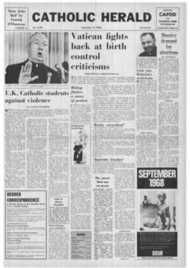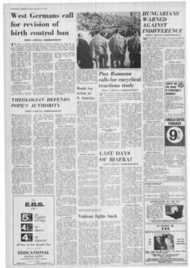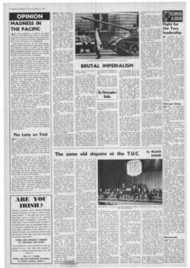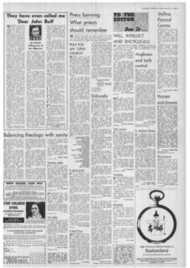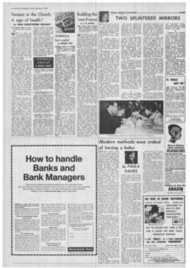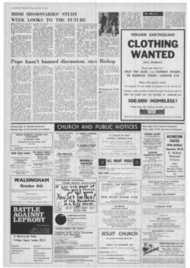Page 1, 13th September 1968
Page 1

Page 2

Report an error
Noticed an error on this page?If you've noticed an error in this article please click here to report it.
Tags
Share
Related articles
Cardinal Condemns Critics Of Pope
Theologian Defends Pope's Authority
Debate Moves On To Nature Of Papal Role
Careerism Goes In Shake-up Of The Curia
Curia Members Urged To Accept Reform 'docilely'
Vatican fights back at birth control criticisms
FROM SPECIAL CORRESPONDENTS
THE POPE and the Curia are launching a powerful campaign to underline the fact that the Papal magisterium continues to be the over-riding Church authority. They consider such action to be necessary in the face of the continuing furore over birth control.
Many theologians see the outcry against the ban on artificial contraception, contained in Humanae Vitae, as a threat to the very vitals of the Church —the Pope's hitherto undisputed and unquestioned authority as the arbiter on all issues of faith and morals.
Evidence of the Vatican counter-attack can be seen in the Pope's rebuke—in a message to the West German Catholics' rally at Essen-to the recent statements by both the Belgian and German bishops, which in effect suggested that in some special cases people with doubts about the encyclical had the right to follow their own consciences.
His reply to this was that individual conscience had no validity in such matters. He criticised those who were "demanding freedom to put forward their own purely personal ideas with an authority which is a clear challenge to he who alone has received this Holy gift from God."
'Revise encyclical'
The message was also a rebuke to the West German Catholics at the rally, who earlier had voted by 2,352 to 90 for a fundamental revision of the encyclical.
But the Curia is mounting its main effort to rout its critics in the columns of L'Osservalore Romano, the semi-official Vatican newspaper. Statements endorsing the encyclical and calling for its complete acceptance have 'been published almost daily.
Now the paper has published three articles by a French theologian, a professor at the Pontifical University of St. Thomas Aquinas in Rome, which insist that the encyclical is binding on all Catholics.
Gagnebet, a Dominician, author of the articles, says that when critics quoted the non-infallible character of the encyclical as a reason to ignore its teachings, they seemed to overlook that there were sure teachings in Catholic doctrine outside those which were the object of an infallible pronouncement.
'Supreme teacher'
Theologians and other Catholics who opposed the encyclical seemed to have lost sight of the very character of the Church's magisterium. This was not a scientific magisterium but a magisterium of authority,
The Pope was "the supreme teacher of the faith, authentically interpreting a divine law and teaching that its observance is imposed on all the faithful. It is a certain theological
doctrine that the Holy Spirit assists the Church in the promulgation of moral and disciplinary laws. This Divine assistance guarantees that when it is a question of laws imposed on the universal church, they cannot be contrary to revelation or natural moral law."
Fr. Gagnebet said the Pope alone had to decide on birth control. It was he who was assisted by the Holy Spirit "and it is he who has the communicable responsibility because Christ conferred on him this authority." It could not be transferred to any commission of experts, no matter how learned or prudent they were.
To argue that the Pope ignored the College of Cardinals or the principle of collegiality was "to perpetuate a false notion of collegiality which the Vatican Council did not approve." The Vicar of Christ had, by virtue of his office, a full, supreme and universal power that he could always exercise freely. Collegiality would always exist, but "with the consent of the head."
ULTIMATUM Meanwhile in America Cardinal O'Boyle, Archbishop of Washington, has given 51 of his priests until tomorrow to withdraw their opposition to the encyclical or face disciplinary action.
They have told him they consider the decision on the use of artificial means of birth control should be left to the consciences of married couples. Cardinal O'Boyle has demanded the priests' full and unconditional compliance with the terms of the encyclical.
He has already suspended
one priest, Fr. Joseph O'Donoghue. for reading dissenting opinions on the encyclical from the pulpit during Mass.
Cardinal O'Boyle said at a Press conference that the real point at issue was not the Pope's encyclical but the authority of the Church hierarchy. "The Catholic Church is certainly not run in such a way that priests who will not follow the pastoral directives of their bishop can be allowed to go on as they like."
Trustees of the Catholic University of America, in Washington, have ordered an inquiry to determine whether 17 members of the teaching staff violated their responsibilities to the university by publicly dissenting from the encyclical.
While the inquiry is sitting the teachers, some priests and some laymen, will be allowed to continue teaching provided they abstain from further opposition. If they do express disagreement they will be suspended without pay.
Mr. Wilbur J. Cohen, American Secretary of Health and Welfare, said on Friday there was widespread support in the country for extending family planning services to all who wanted them. He was addressing the Conference of Ministers of Social Welfare at the United Nations in New York.
He said that last year there were about 450,000 unwanted pregnancies among eight million low income women in America. Family planning services, available to all parents on a voluntary basis, could contribute significantly to the field of child development.
Mr. Cohen suggested that the conference should set up an advisory committee to provide expert guidance for U Thant, U.N. Secretary-General, on the subject.
blog comments powered by Disqus


